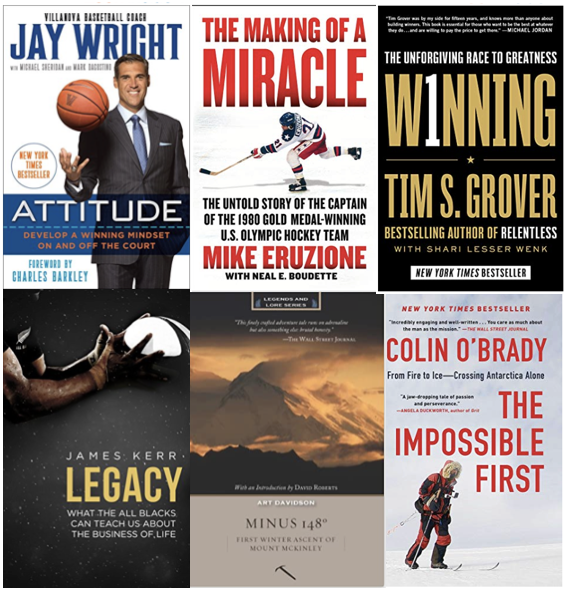
By Brian Reed
I love to read. As a Soldier and a leader, I like to read history and books on leadership. When I open the aperture, I like to read about the strength of the human spirit with an eye toward being a better human being – more disciplined, more mentally strong, and a better teammate. These are 7 books that are meaningful to me.
Being More Disciplined – Focus, Attitude, and Self Discipline
Legacy: What the All Blacks Can Teach Us About the Business of Life by James Kerr
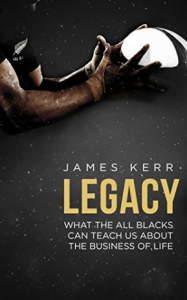
“In the best-selling Legacy, James Kerr goes deep into the heart of the world’s most successful sporting team, the legendary All Blacks of New Zealand, to reveal 15 powerful and practical lessons for leadership.”
This book is more than about leading teams or organizations. It is about leading oneself. My favorite lesson from the book is: “There are no crowds on the extra mile. On the extra mile, we are on our own: just us and the road, just us and the blank sheet of paper, just us and the challenge we’ve set ourself. It’s the work we do behind closed doors that makes the difference out on the field of play, in whatever field we compete, whether we’re in a team, leading a business, or just leading our life.” The implication here is that champions do extra, in all aspects of life, and not just in what matters to them most. This is one of many powerful life lessons in the book.
Unfortunately, I came to this book a bit later in my career. The good news is that I have used the lessons from Kerr’s book in professional development sessions I have conducted with cadets at the U.S. Military Academy and 2 of our Division 1 athletic teams – Men’s Lacrosse and Football. I also made this mandatory reading for the officers and NCOs in my organization.
Attitude: Develop a Winning Mindset On and Off the Court by Jay Wright
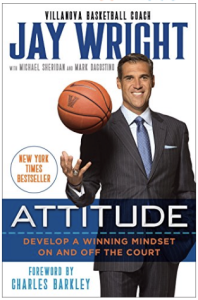 “When Kris Jenkins sank a three-pointer at the buzzer to win the 2016 NCAA Tournament, it was a victory not just for a team and its coach but for an entire program…In Attitude, Coach Wright shares some of the leadership secrets that have enabled Villanova, a private university with an undergraduate enrollment of less than 6,500, to thrive in the hypercompetitive world of college athletics.”
“When Kris Jenkins sank a three-pointer at the buzzer to win the 2016 NCAA Tournament, it was a victory not just for a team and its coach but for an entire program…In Attitude, Coach Wright shares some of the leadership secrets that have enabled Villanova, a private university with an undergraduate enrollment of less than 6,500, to thrive in the hypercompetitive world of college athletics.”
I read this book shortly after it was released in 2017. I was drawn to the book partly because of my Philly roots (Villanova is a Philadelphia area school and a member of the famed Philadelphia “Big 5”) and because of my interest in how coaches build winning teams.
In this book, Jay Wright lays out a recipe for successful teams around a series of key principles that he developed over the course of his career in college basketball. This proved to be a winning formula as his teams won the NCAA Men’s Basketball Tournament in 2016 and again in 2018. That said, what I also appreciated about this book was how these principles applied to me in the here and now, and the insights to be a better human being in my personal and professional life. Principles like “Be Here Now,” “Real Progress Comes When No One’s Watching,” or “Humble and Hungry” are not just about team performance, but also individual excellence.
Winning: The Unforgiving Race to Greatness by Tim S. Grover with Shari Lesser Wenk
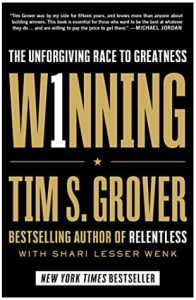 “This book reveals the truth about the obstacles and challenges that could be standing between you and your goals: Winning never lies. Winning knows your secrets. Winning wages war on the battlefield of your mind. Winning wants all of you. And more.”
“This book reveals the truth about the obstacles and challenges that could be standing between you and your goals: Winning never lies. Winning knows your secrets. Winning wages war on the battlefield of your mind. Winning wants all of you. And more.”
I read Grover’s first book, Relentless: From Good to Great to Unstoppable, a few years ago and I was blown away by the practical lessons on life performance. He seemed to be challenging me. Winning is even better. What first got me hooked on Grover’s work was a quote I saw from Michael Jordan (that is also on the front cover of this book): “Tim Grover was by my side for fifteen years, and knows more about building winners. This book is essential for those who want to be the best at whatever they do…and are willing to pay the price to get there.” This is from arguably the greatest basketball player in history, and certainly one of the fiercest competitors the NBA has ever seen.
My copy of the book is heavily dog-eared with notes in the margin and on the inside back cover. This is not motivational or inspirational reading…it is attitude and behavior oriented. It’s not about trying…it’s about doing. It can be life changing. A few examples that highlight this point: “compete at a higher level than the day before…small decisions…little changes”; “face the reality about who you are…your shortcomings and what you need to do to win…stop BSing yourself”; and my favorite, “focus is highly conscious – need to be sharp and aware of every moment…it’s about controlling your behaviors so it becomes easier to do the right things and harder to be distracted by the wrong things.”
Being More Mentally Strong – Feats of Strength
Minus 148 Degrees: The First Winter Ascent of Mount McKinley by Art Davidson
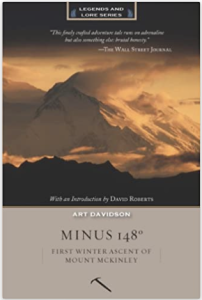 “In 1967, eight men attempted North America’s highest summit: Mount McKinley (now known as Denali) had been climbed before but never in winter. Plagued by doubts and cold, group tension and a crevasse tragedy, the expedition tackled McKinley in minimal hours of daylight and fierce storms. They were trapped at three different camps above 14,000 feet during a six-day blizzard and faced the ultimate low temperature of 148 F…Minus 148 is Art Davidson’s stunning personal narrative.”
“In 1967, eight men attempted North America’s highest summit: Mount McKinley (now known as Denali) had been climbed before but never in winter. Plagued by doubts and cold, group tension and a crevasse tragedy, the expedition tackled McKinley in minimal hours of daylight and fierce storms. They were trapped at three different camps above 14,000 feet during a six-day blizzard and faced the ultimate low temperature of 148 F…Minus 148 is Art Davidson’s stunning personal narrative.”
I first read this book back in 2006 when I was stationed in Alaska. I re-read it about 2 years ago before my own expedition to Denali in May 2021. I was looking for a story that would speak to the power of grit and mental toughness in mountaineering. I found it in this incredible story. Over a period of 42 days in 1967, Art and his team battled hurricane-like winds, massive snowfall, and brutally cold temperatures to reach the summit. On their descent, the team was trapped by a week-long storm with a wind chill temperature calculated at -148 degrees. From the American Alpine Website:
“It is the six-day bivouac after the summit that Dave Johnston, Ray Genet, and the author spent at Denali Pass during a violent and continuous storm, that stands at the center of this account…[t]heir survival was partly due to endurance and courage, but also – what is more interesting, and more to the author’s credit for conveying – to luck and hunch. The week that the three spent in a partially excavated snow cave in winter near the summit of North America’s highest mountain ranks, by itself, as one of the rare classic stories of survival in mountaineering annals.”
This is an epic story that demonstrates the resiliency of the human spirit.
The Impossible First: From Fire to Ice – Crossing Antarctica Alone by Colin O’Brady
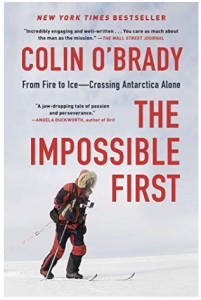 “Prior to December 2018, no individual had ever crossed the landmass of Antarctica alone, without support and completely human powered. Yet, Colin O’Brady was determined to do just that…[e]nduring Antarctica’s sub-zero temperatures and pulling a sled that initially weighed 375 pounds—in complete isolation and through a succession of whiteouts, storms, and a series of near disasters—O’Brady persevered…Alone with his thoughts for nearly two months in the vastness of the frozen continent—gripped by fear and doubt—he reflected on his past, seeking courage and inspiration in the relationships and experiences that had shaped his life.”
“Prior to December 2018, no individual had ever crossed the landmass of Antarctica alone, without support and completely human powered. Yet, Colin O’Brady was determined to do just that…[e]nduring Antarctica’s sub-zero temperatures and pulling a sled that initially weighed 375 pounds—in complete isolation and through a succession of whiteouts, storms, and a series of near disasters—O’Brady persevered…Alone with his thoughts for nearly two months in the vastness of the frozen continent—gripped by fear and doubt—he reflected on his past, seeking courage and inspiration in the relationships and experiences that had shaped his life.”
This is another book I read before Denali 2021. What drove me in this direction were the stories of mental and emotional strength to overcome incredibly difficult environmental conditions and physically exhausting endeavors. I knew (or at least felt) that when I got to Denali, I would be physically ready – or as ready as I could be. It was the mental game that I was more focused on with a book like this one. O’Brady’s story provided inspiration and resolution in the face of adversity unlike any other book I read (aside from Minus 148).
Colin never quit despite the environmental conditions, his own mental state, and his health.
“Fifty-three days into his solo trek across Antarctica and 77 miles from his goal, Colin O’Brady was exhausted and starving. Running out of food, he had stretched out his daily rations to keep himself alive. “My ribs were sticking out, my hips were sticking out,” he recalls. “I had frostbite on my hands and cheeks.” It was Christmas Day 2018, and he could barely summon the energy to pack his bags onto the sled he pulled behind him. But then he started and, step by step, something in him shifted: “My mind came alive. I said to myself, ‘What if I don’t stop? What if I just keep going?’” (Elizabeth Winkler, Wall Street Journal, January 2020)
And he did keep going, and he became the first person to cross Antarctica unsupported!
Being a Good Teammate – Great Teams
The Making of a Miracle: The Untold Story of the Captain of the 1980 Gold Medal-Winning U.S. Olympic Hockey Team by Mike Eruzione with Neal E. Boudette
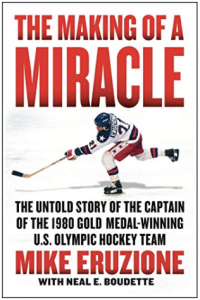 “Mike Eruzione, the captain of the 1980 U.S Men s Olympic Hockey Team, who scored the winning goal recounts his amazing career on ice, the legendary upset against the Soviets, and winning the gold medal…It is the greatest American underdog sports story ever told: how a team of college kids and unsigned amateurs, under the tutelage of legendary coach and legendary taskmaster Herb Brooks, beat the elite Soviet hockey team on their way to winning the gold medal at the 1980 Lake Placid Olympics….But beating the U.S.S.R was only one of the numerous challenges Mike has faced in his life. In this inspiring memoir, he recounts the obstacles he has overcome, from his blue-collar upbringing in Winthrop, Massachusetts…to his selection to the U.S. team and their run for gold.”
“Mike Eruzione, the captain of the 1980 U.S Men s Olympic Hockey Team, who scored the winning goal recounts his amazing career on ice, the legendary upset against the Soviets, and winning the gold medal…It is the greatest American underdog sports story ever told: how a team of college kids and unsigned amateurs, under the tutelage of legendary coach and legendary taskmaster Herb Brooks, beat the elite Soviet hockey team on their way to winning the gold medal at the 1980 Lake Placid Olympics….But beating the U.S.S.R was only one of the numerous challenges Mike has faced in his life. In this inspiring memoir, he recounts the obstacles he has overcome, from his blue-collar upbringing in Winthrop, Massachusetts…to his selection to the U.S. team and their run for gold.”
This is the second book I have read about the 1980 U.S. Men’s Olympic Hockey Team. The first was The Boys of Winter by Wayne Coffey. While both books are exceptional, what I liked particularly about this book was that it was written by the captain of the team. This first-person account is a real-life example of building and leading a team – told from the perspective of the guy who led the team on and off the ice – and it highlights each player’s role on the team, and why these roles were critical to winning hockey. Mike’s role was to be the team captain and be the steadying hand of the team. While he wasn’t the best player on the team, nor had a post-Olympic career in the NHL, he was the anchor of that 1980 team. It is very likely the team does not beat the Soviets or win the Olympic Gold Medal without his leadership. Mike Eruzione was a great teammate.
The Boys in the Boat: Nine Americans and their Epic Quest for Gold at the 1936 Berlin Olympics by Daniel James Brown
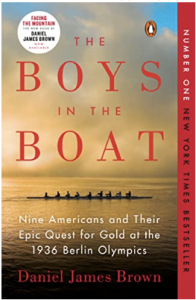 “The improbable, intimate account of how nine working-class boys from the American West showed the world at the 1936 Olympics in Berlin what true grit really meant…It was an unlikely quest from the start. With a team composed of the sons of loggers, shipyard workers, and farmers, the University of Washington’s eight-oar crew team was never expected to defeat the elite teams of the East Coast and Great Britain, yet they did, going on to shock the world by defeating the German team rowing for Adolf Hitler.”
“The improbable, intimate account of how nine working-class boys from the American West showed the world at the 1936 Olympics in Berlin what true grit really meant…It was an unlikely quest from the start. With a team composed of the sons of loggers, shipyard workers, and farmers, the University of Washington’s eight-oar crew team was never expected to defeat the elite teams of the East Coast and Great Britain, yet they did, going on to shock the world by defeating the German team rowing for Adolf Hitler.”
Perhaps the most important message of this story is about the power of teamwork and trust. In a boat of 9 (8 oars and 1 coxswain), it takes everyone pulling in the same direction, the same pace, and the same stroke to win. It is trust and teamwork at its finest. As best explained by LitArts:
“Rowing is one of the most collaborative sports: on an eight-oar rowing team, all eight rowers must move in perfect or near-perfect synchronization. Even a tiny mistake can throw off the delicate rhythm of the team. Because oarsmen need to move together so precisely, they must develop a close psychological bond of friendship and respect to succeed. The Boys in the Boat isn’t just the story of how the 1936 Olympic rowers perfected their technique and power; it’s about how the nine teammates (eight oarsmen plus a coxswain) learned to work together, and became lifelong friends in the process.”
Not only is this an inspirational story, the themes of resilience, grit, teamwork, and trust are great life lessons for my personal and professional life.
Brian Reed is a Soldier with 33+ years of active service as an Infantryman in the US Army.
Want to be a paid, MTI contributor? Learn more HERE.
